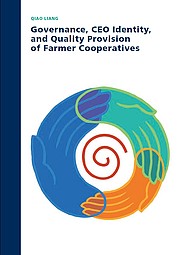Governance, CEO Identity, and Quality Provision of Farmer Cooperatives Defended on Thursday, 21 March 2013
Governance structure specifies the allocation of ownership rights, decision rights, and income rights. A cooperative is characterized by user ownership, user control, and user benefits. The focus of this thesis is on various governance structure characteristics and the efficiency of farmer cooperatives. Special attention is dedicated to cooperatives in China. The thesis consists of six chapters. Chapter 1 outlines the structure of the thesis and provides an overview of farmer cooperatives in China, especially in terms of the history, the modes, and organization characteristics. The genesis of farmer cooperatives in China is described in chapter 2. Chapter 3 delineates the governance structure of Chinese farmer cooperatives in terms of the allocation of ownership rights, decision rights, and income rights within the membership. A principal-agent model is developed in chapter 4 to explore the efficiency of cooperatives with different CEO identities, member CEO or outside CEO. Chapter 5 examines how farmers producing differentiated quality products choose different governance structures in a non-cooperative game. Besides, the impact of the cooperatives’ presence in the market on the welfare of various stakeholders is analyzed. We conclude in chapter 6.
Keywords
farmer cooperative, china, genesis, governance structure, ceo identity, quality provision, pooling, yardstick effect








